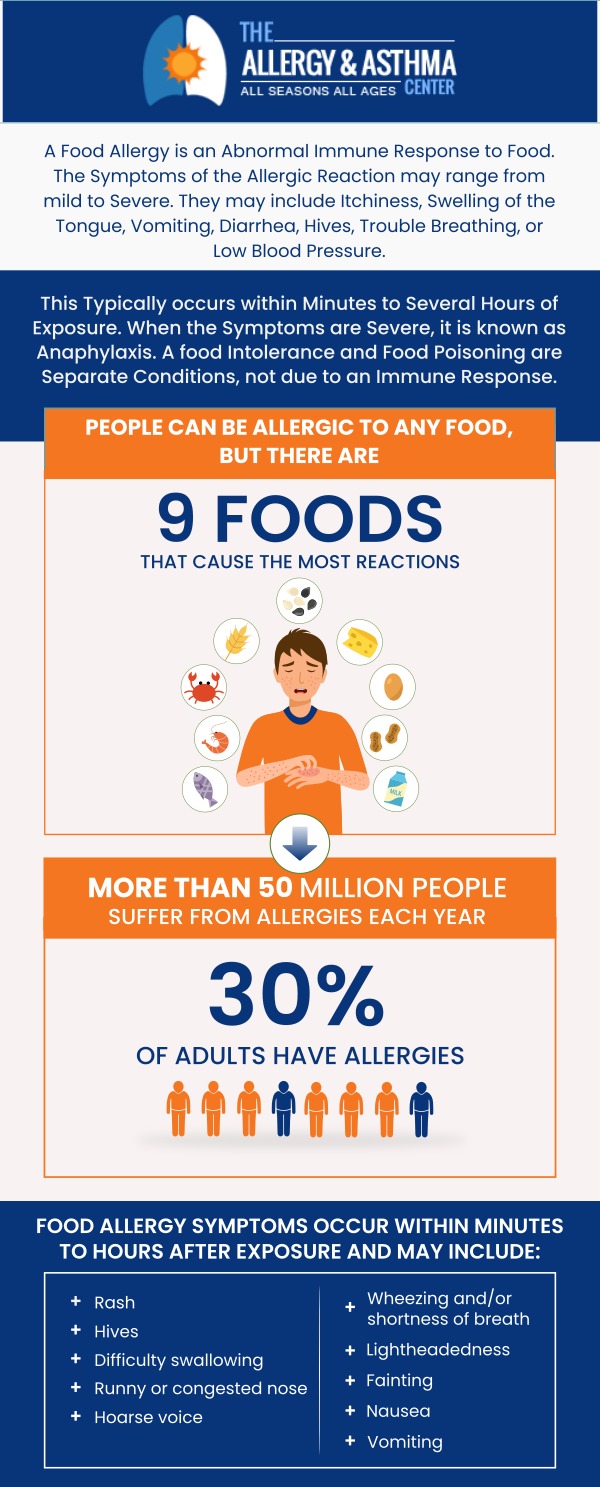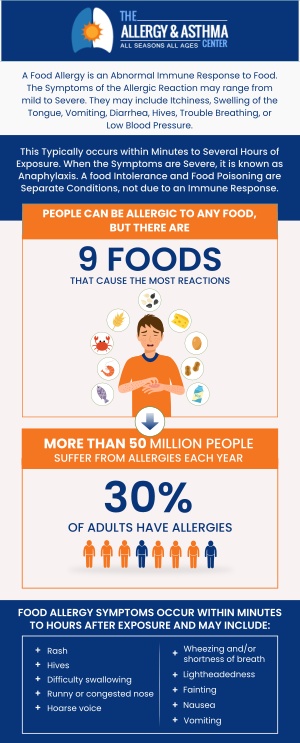Consultation with Food Allergist, What to Expect?
Visiting a food allergist, like Dr. Jon E. Stahlman, MD, at the Allergy & Asthma Center, helps accurately diagnose food allergies and develop personalized management plans. Dr. Stahlman provides expert guidance on identifying triggers, preventing reactions, and improving overall quality of life with tailored treatment strategies. For more information, contact us or book an appointment online. We have convenient locations to serve you in Lawrenceville GA, Atlanta GA, and Conyers GA.




Table of Contents:
What are the symptoms of food allergies?
Can an allergist help with food sensitivity?
Can an allergist detect food allergies?
Is food sensitivity the same as food allergies?
Consult with our allergists at the Allergy & Asthma Center
One commonly observed symptom is a tingling sensation in the mouth, and swelling of the lips, tongue, throat, or face, also known as angioedema. This swelling is often caused by increased blood flow and fluid build-up in the affected areas, triggered by the release of histamines and other inflammatory substances by the immune system.
Many patients also experience skin reactions, such as hives or eczema, as well as gastrointestinal distress, including nausea, vomiting, diarrhea, abdominal pain, and bloating. These symptoms are caused by the body’s immune system wrongly recognizing the meal as dangerous and triggering an inflammatory response in the digestive tract.
In addition, food allergies can also induce respiratory difficulties such as wheezing, shortness of breath, and coughing, which can be particularly concerning for patients with pre-existing respiratory conditions like asthma or allergies.
In some severe cases, food allergies can cause a drop in blood pressure, leading to dizziness, lightheadedness, fainting, or confusion. Other less common reactions include headache and fatigue.
Food sensitivity, a condition that often gets confused with a food allergy, refers to difficulty in digesting certain foods rather than an immune reaction. Symptoms of food sensitivity often resemble those of a food allergy, such as digestive issues, headaches, fatigue, and skin reactions, but they usually occur several hours after eating the problematic food. While not life-threatening like food allergies, food sensitivity can significantly impact one’s quality of life.
At Allergy & Asthma Center our allergists specialize in diagnosing and treating allergies, including food allergies and food sensitivities. By conducting thorough evaluations, our allergists can distinguish between true food allergies and food sensitivities, providing precious insights into managing these conditions. They can perform various tests, like taking a medical history, conducting a skin prick test, initiating an elimination diet, or even a food challenge to identify the specific food items causing problems.
If an allergist diagnoses food sensitivity, they can guide patients on how to eliminate these problematic foods from their diet and suggest alternatives. The main treatment for food sensitivity is to avoid the culprit foods, so this guidance is an essential part of managing the condition. Allergists may recommend adjusting your diet to reduce the risk of exposure to trigger foods and provide medications or other therapies to alleviate symptoms if accidental exposure occurs.
Moreover, allergists also help monitor a patient’s progress and adjust the treatment plan as necessary. This is particularly important because food sensitivity can change over time, and what may cause problems now may not cause issues in the future.
Food allergies can trigger a variety of reactions ranging from mild discomfort to life-threatening anaphylaxis. Identifying and managing these allergies is crucial, and our allergists, who specialize in allergies and immunology, play a vital role in detecting them. They conduct comprehensive evaluations, using a variety of tests and methods, to determine if an individual is allergic to specific foods.
Allergists employ various diagnostic tests such as:
● Skin prick test: Also known as a puncture or scratch test, an allergist pricks or scratches small amounts of suspected allergens into the skin and observes for signs of an allergic reaction such as redness or inflammation.
● Blood test: The most common is the ImmunoCAP Specific IgE blood test, which measures the number of specific antibodies (immunoglobulin E, or IgE) in response to an allergic reaction.
● Oral food challenge: Here, under careful supervision, the patient consumes small but gradually increasing amounts of a suspected allergen. An allergist then closely observes the patient for signs of an allergic reaction.
The interpretation of test results is crucial in diagnosing food allergies. A patient may test positive for a food allergy on a skin prick or blood test but show no symptoms when consuming the food. Conversely, some patients may test negative on these tests but still experience symptoms when eating certain foods. Therefore, allergists often consider these tests in combination with a patient’s medical history and symptoms to make a definitive diagnosis.
Despite the effectiveness of these tests, some allergies may not be detectable, or results can vary depending on the timing of the test and the patient’s overall health status.
After detecting a food allergy, an allergist will recommend appropriate management strategies. These include avoidance of the allergen, medical management with medications like antihistamines or epinephrine for immediate allergic reactions, and comprehensive education on the recognition and management of reactions.
Food sensitivity and food allergies are two different types of adverse reactions to certain foods, each involving distinct symptoms and different bodily reactions. Food allergies involve an immune system response, which can be life-threatening, as the immune system mistakenly identifies a certain food as harmful and triggers a protective response.
Both conditions can cause mild to severe symptoms that appear minutes to hours after consuming an unhealthy meal. We use a comprehensive approach to diagnose these conditions, which often involves elimination diets and other tests to identify potential triggers. Our experienced healthcare professionals and allergists provide accurate diagnoses and effective treatment plans to manage these conditions.
Our approach to managing food allergies and sensitivities is guided by the unique needs of each patient. For food allergies, we often recommend complete avoidance of the allergenic food, while for food sensitivities, we primarily focus on identifying and avoiding the triggering foods. Dietary changes or adopting an elimination diet can be effective in reducing symptoms. In some cases, managing food sensitivity may just require limiting the intake of the problematic food or managing the symptoms. Nutritional supplements or therapies may be recommended to support gut health and reduce inflammation.
Consulting with our board-certified allergists at The Allergy & Asthma Center is the definitive first step toward managing your symptoms and improving your quality of life. Our specialists possess extensive training and knowledge in Allergy and Immunology, allowing them to move beyond temporary relief to provide a precise diagnosis of your specific triggers. By utilizing state-of-the-art testing and creating a personalized, evidence-based treatment plan—which may include long-term solutions like immunotherapy—our team will empower you to find lasting relief from allergies, asthma, and related conditions.
At Allergy & Asthma Center, we understand the differences between food sensitivities and food allergies and the importance of this understanding for proper diagnosis and treatment. For more information, contact us or book an appointment online. We serve patients from Lawrenceville GA, Atlanta GA, Conyers GA, Scottdale GA, Tucker GA, Rock Chapel Rd GA, Klondike Rd GA, Suwanee GA, Moon Place Rd GA and Dacula GA.
Check Out Our 5 Star Reviews


Additional Allergy & Asthma Services
▸ Allergy Shots
▸ Allergy Testing
▸ Asthma
▸ Bronchodilators
▸ Drug Allergy
▸ Food Allergy
▸ Insect Allergy
▸ Nasal/Sinus Allergies
▸ Pediatric Allergy
▸ Pediatric Asthma
▸ Skin Allergy
▸ Spring Allergies




